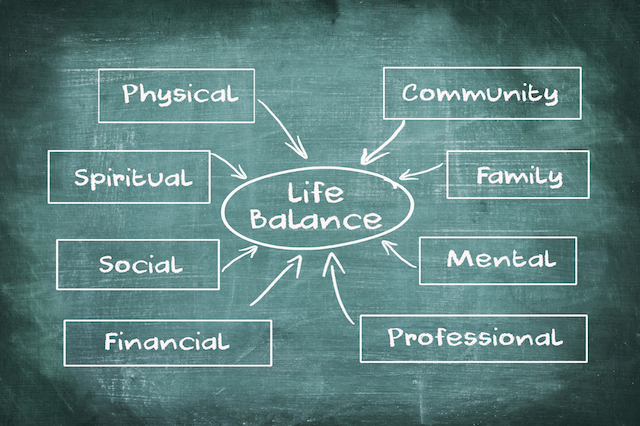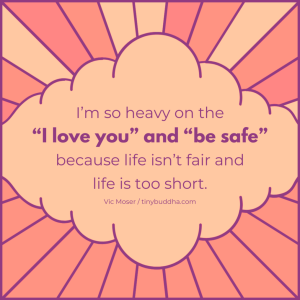
“Happiness is not a matter of intensity but of balance and order and rhythm and harmony.” ~Thomas Merton
Balance has become an ever-elusive thing these days. The onslaught of technological breakthroughs, aimed at making life easier, has given way to a societal expectation that we are available around the clock.
This has bled into our careers, where our employers have ever increasing expectations that we can do more in less time. We have 168 hours in our week to sleep, work, rest, be with our loved ones, and pursue personal interests.
Unfortunately, the majority of people in the world today complain that they aren’t able to keep up with the competing commitments that steal much of their precious time.
It’s no longer enough to contemplate how this happened and talk about the “good ole days” when life was easier and the days were longer.
We need to identify what balance looks like for us (as it differs from person to person), work on regaining some of our time, and find more balance so we can truly show up and be present in all the different areas of our lives.
My wake-up call about my imbalanced life came when I lost my best friend to suicide a few years ago.
When you experience a sudden loss of this magnitude, you most certainly find yourself in a place of deep contemplation and restructuring. I recognized my own mortality in a way I hadn’t before.
As a result, I had to do some housekeeping in order to get my life “up to snuff,” so I took an honest and meaningful inventory of all the different parts of my life.
I looked at the people I was spending my time with, the activities I engaged in, and the places I dwelled. I asked myself if these people, activities, and places were feeding my soul, supporting my journey, and providing love and support.
It was through this inventory I realized how out of balance my life was. It’s also how I came up with the action plan I am sharing with you now
1. Start with a values inventory.
You want to sit down, grab a pen and a piece of paper, and list all of the values that are important to you. You’ll also want to put them in order of importance.
Some of my top life values include happiness, love, fellowship, integrity, and spirituality. It’s important to note that your top values are defined only by you and carry their own power and placement in your life.
For example, I define spirituality as my connection to, and relationship with, the source of all things. I honor that value through daily meditation, prayer, and my efforts to make the world a better place through my work and my charity fund. I also honor that value by ensuring I live a life full of generosity, gratitude, respect, and compassion.
2. Look at your life domains and identify the imbalances present in each area.
When I speak about life domains, I’m talking about self, career, relationships, and community.
Self: This domain includes you, your time, your interests, and your self-care.
Career: This domain speaks to your current job and your employer.
Relationships: This domain speaks to your loved ones, both friends and family.
Community: This domain speaks to your participation in your local community (volunteer work, belonging to a religious or spiritual institution, coaching your child’s little league team, etc.)
Again, you want to grab a pen and a piece of paper. For each of your four life domains, identify what the ideal balance would be. Be detailed in your description of each life domain.
For example, in the relationships domain, identify those people you would want to see on a regular basis. What frequency would you like to see them and under what circumstances? What would you need to do in order to make that happen?
You should also weave in your top values to better understand how they should support your efforts in each life domain.
For example, I would talk about the importance of my value around love and how it plays out in the relationship domain. I would write about my choice to surround myself only with kind, loving people who support me and I support in return.
The goal here is to create an ideal vision of balance in each domain.
3. Write about the current status of each life domain.
If your life domains are imbalanced, write down the details surrounding the imbalances and what you’ll need to do to get them in alignment.
For example, if your career domain is imbalanced because you’re working too many hours for a demanding supervisor, think about the steps you’ll need to take to regain your balance.
Maybe it’s talking to your boss about getting you some help or working fewer hours. If your work environment isn’t conducive with this type of dialogue, maybe looking for a better job is a consideration.
If some of your life domains are in balance, write about the steps you are committing to in order to prevent them from being compromised. It’s important to be clear on your approach to living, and maintaining, a balanced life.
4. Begin implementing the changes you want to see in a realistic and bite size manner.
You want to focus on one domain at a time, and tackle one change at time. Pick a domain and implement your first change.
Once you have grown comfortable with this change and it is now part of your “new normal,” you can move on to the next change.
When you have implemented all of the changes in your first domain, and reached the balance you desire, you can move to the next domain. I would suggest starting with the easiest changes first.
Start to build momentum with the changes that will help you create more balance right away. Maybe that’s turning off your work computer at 8:00 every night so you can be with your family, eating healthier, or committing to visiting your parents every Sunday morning.
These are small changes that can have a big impact on your life!
—
At the end of the day, this is all about you living a regret-free existence. Later in life, you don’t want to look back and feel regret for neglecting certain parts of your life (children, health, career aspirations, etc.) because you didn’t take the steps necessary to make things better.
Balance isn’t easy to achieve, but it is well worth the effort. Make a commitment to find your balance today!
Life balance image via Shutterstock
About Joel Readence
Joel is a Life and Executive Coach working with his clients in areas such as spirituality, life purpose, relationships, and career exploration. He partners with his clients to help them overcome fear of success, failure and judgment by others. Joel is a Certified Professional Coach, accredited through the Institute for Professional Excellence in Coaching (iPEC). Visit him at joelreadence.com.













 Though I run this site, it is not mine. It's ours. It's not about me. It's about us. Your stories and your wisdom are just as meaningful as mine.
Though I run this site, it is not mine. It's ours. It's not about me. It's about us. Your stories and your wisdom are just as meaningful as mine.